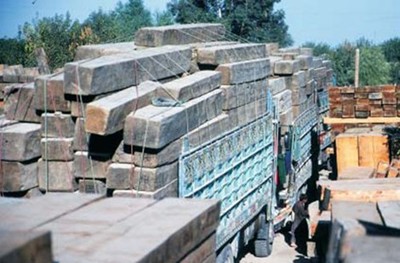The eastern Afghan province of Nangarhar has lost about 90 percent of its forests since 1989 - a major contributory factor to aridity, air pollution, loss of habitat and vulnerability to flash floods, according to experts and provincial officials.

Timber smuggling from Afghanistan to Pakistan in full force (Photo: Martyn Murray)
Millions of trees have been lost in Nangarhar and the neighbouring provinces of Kunar and Nooristan and the ecosystem has been severely damaged because of deforestation, in part induced by drought, officials say.
In 2006 Afghan President Hamid Karzai banned tree-felling, but deforestation has continued with large-scale illegal timber exports.
Trees have also been cut down by people in need of firewood for heating and cooking. "People still cut [down] trees on a large scale because we lack adequate means to stop them," Hamidullah Nazir, forestry management officer at the department of agriculture in Nangarhar, told IRIN.
"In the past, over 134,000 hectares of land in the 11 districts of Nangarhar Province were forest, but now tree cover is down to less than 15,000 hectares," Nazir said.
Large tracts of forest have also been lost to what were initially small fires. These often get out of control as Nangarhar only has two fire engines and very limited fire-fighting resources.
Afghan cities such as Kabul and Jalalabad (the capital of Nangarhar Province) are facing a serious crisis of air pollution which threatens public health, the National Environmental Protection Agency (NEPA) has warned, and it linked current pollution levels to rapid deforestation: Forests are effective in soaking up carbon dioxide and producing oxygen.
Deforestation has also made the country more prone to flash floods and landslides. Every year floods cause human deaths and loss of property in Nangarhar, Kunar and Laghman provinces, according to the Afghanistan National Disasters Management Authority.
"Deforestation has contributed to the longstanding drought in the country," Ahmad Bakhtyar, an expert at the Ministry of Agriculture, told IRIN.
The country has also lost much of its wildlife such as snow leopard, Marco Polo sheep and Asiatic black bear because of deforestation, climate change and other environmental impacts.
Ranked the fifth least developed country in the world by the UN Development Programme, Afghanistan does not have sufficient institutional means to ensure better forest management, which has received little, if any, support from the government and its international backers in the past seven years.



